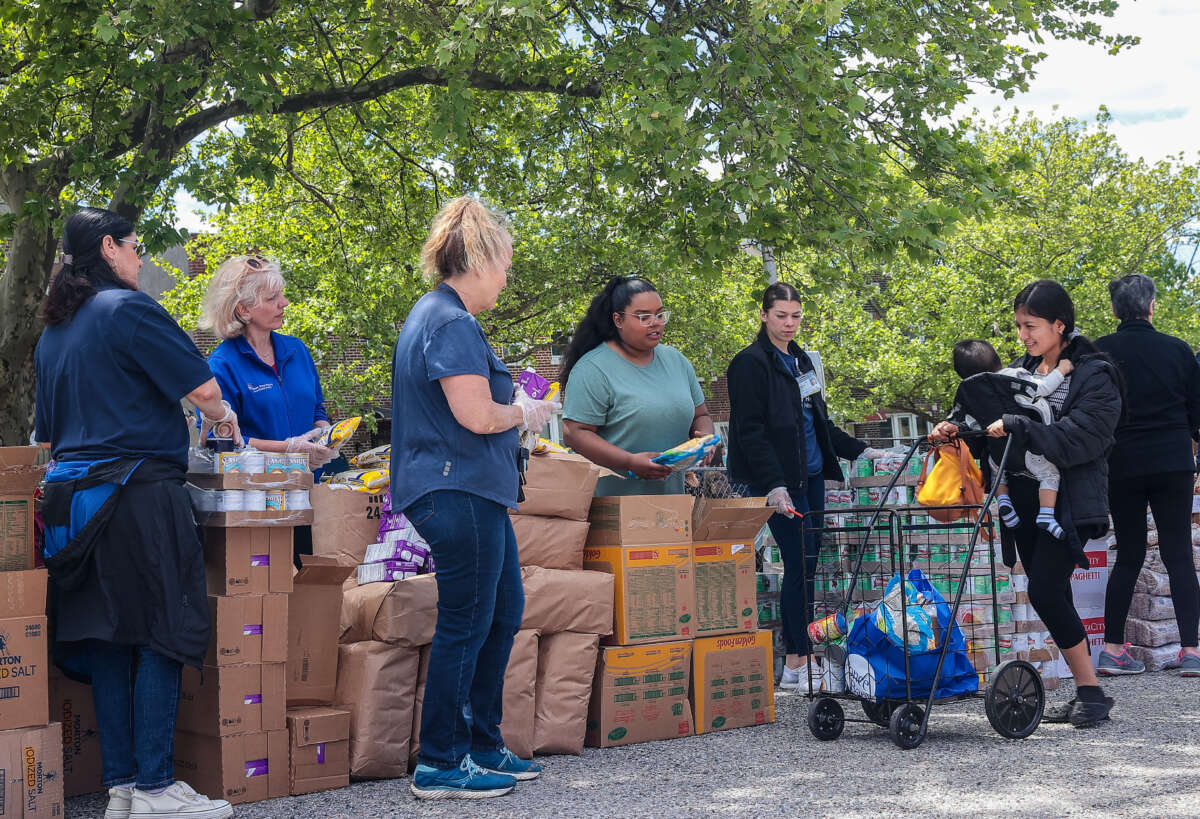Did you know that Truthout is a nonprofit and independently funded by readers like you? If you value what we do, please support our work with a donation.
Highlighting the end of a yearslong trend of declining hunger in the United States due largely to federal policies like the expanded Child Tax Credit and universal school meals, a report published Wednesday details how the expiration of these programs has fueled a resurgence in food insecurity.
Hunger Free America’s (HFA) 2023 National Hunger Survey Report found that “the number of Americans without enough food over a seven-day period was an average of 40% higher in September and October of 2023 than in September and October of 2021.”
“Over that time period, the number of people without enough food increased from 19.7 million to 27.8 million nationwide,” HFA noted, attributing the rise in hunger to the expiration of the expanded Child Tax Credit and universal school meals.
“Many federal benefit increases have either gone away entirely, or are being ramped down, even as prices for food, rent, healthcare, and fuel continue to soar,” the advocacy group added.
Over the past two days, HFA hosted events in 3 different counties to highlight the jarring numbers from our new hunger survey. Hunger throughout the US is up 40% from 2 years ago. In New York state, hunger is up 14%. You can read the latest data here: https://t.co/usJByxKUVm pic.twitter.com/GAiuZp9dKy
— Hunger Free America (@HungerFreeUSA) November 22, 2023
Among the report’s other findings:
- The states with the highest rates of food-insecure children were Delaware (21.4%), Nebraska (21.0%), Texas (20.7%), Georgia (20.0%), Kentucky (19.7%), and Louisiana (19.7%);
- Nationally, 9.1% of employed adults in the U.S. lived in food-insecure households during the three-year time period;
- The states with the highest rates of food insecurity among employed adults were Arkansas (13.7%), Texas (13.4%), Louisiana (12.5%), South Carolina (12.5%), and Oklahoma (12.4%);
- 7.6% of older Americans, defined as people 60 years and older, lived in food-insecure households;
- Louisiana had the highest rate of food insecurity among older Americans at 13.9%, followed by Mississippi (12.7%), the District of Columbia (12.6%), West Virginia (11.0%), and Oklahoma (10.4%); and
- The states with the lowest rates of food insecurity were New Hampshire (6.1%), Minnesota (7.3%), Vermont (7.7%), Colorado (8.4%), and North Dakota (8.6%).
“This report should be a jarring wake-up call for our federal, state, and local leaders,” HFA CEO Joel Berg said in a statement.
The new HFA report follows federal data released in November showing the U.S. child poverty rate more than doubled in 2022 compared to the previous year, thanks in large part to the expiration of the expanded Child Tax Credit. Under the policy — part of the American Rescue Plan signed into law by President Joe Biden in March 2021 — eligible families received up to $300 per child each month.
However, the program expired at the end of 2021 as congressional Republicans and right-wing Democratic Sen. Joe Manchin of West Virginia opposed its extension. Manchin infamously argued that parents would use the money to buy drugs instead of food for their children.
Meanwhile, congressional Republicans last year blocked the extension of a pandemic-era policy under which public schools offered free breakfast and lunch to tens of millions of children.
“Effective federal public policies over the previous few years were spectacularly successful in stemming U.S. hunger, but as many of those policies have been reversed, hunger has again soared,” Berg said on Wednesday. “At exactly the moment when so many Americans are in desperate need of relief, many of the federally funded benefits increases, such as the Child Tax Credit and universal school meals, have expired, due mostly to opposition from conservatives in Congress.”
“Just as no one should be surprised if drought increases when water is taken away, no one should be shocked that when the government takes away food, as well as money to buy food, hunger rises,” Berg added. “Our political leaders must act to raise wages and provide a strong safety net, so we can finally end U.S. hunger and ensure that all Americans have access to adequate, healthy food.”
Trump is silencing political dissent. We appeal for your support.
Progressive nonprofits are the latest target caught in Trump’s crosshairs. With the aim of eliminating political opposition, Trump and his sycophants are working to curb government funding, constrain private foundations, and even cut tax-exempt status from organizations he dislikes.
We’re concerned, because Truthout is not immune to such bad-faith attacks.
We can only resist Trump’s attacks by cultivating a strong base of support. The right-wing mediasphere is funded comfortably by billionaire owners and venture capitalist philanthropists. At Truthout, we have you.
Truthout has launched a fundraiser to raise $38,000 in the next 6 days. Please take a meaningful action in the fight against authoritarianism: make a one-time or monthly donation to Truthout. If you have the means, please dig deep.
